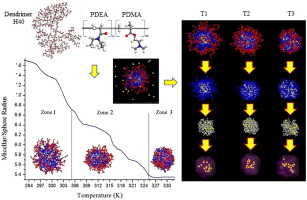当前位置:
X-MOL 学术
›
Eur. Polym. J.
›
论文详情
Our official English website, www.x-mol.net, welcomes your
feedback! (Note: you will need to create a separate account there.)
Theoretical study of thermoresponsive dendritic polymeric micelles: Micellar phase control and the extraction of organic molecules by temperature effects
European Polymer Journal ( IF 5.8 ) Pub Date : 2020-03-01 , DOI: 10.1016/j.eurpolymj.2020.109596 César Soto-Figueroa , Tomas Galicia-García , María del Rosario Rodríguez-Hidalgo , Luis Vicente
European Polymer Journal ( IF 5.8 ) Pub Date : 2020-03-01 , DOI: 10.1016/j.eurpolymj.2020.109596 César Soto-Figueroa , Tomas Galicia-García , María del Rosario Rodríguez-Hidalgo , Luis Vicente

|
Abstract Smart dendritic micelles are stimuli-sensitive dendritic polymeric micelles that combine the characteristics of double-hydrophilic diblock copolymers and hyperbranched dendritic molecules. The micellar phase control of the smart dendritic micelles consisting of Boltorn-H40 hyperbranched dendrimer and poly(N,N-diethylacrylamide)-b-poly(2-(dimethylamino)ethyl methacrylate) diblock copolymer (H40-PDEA–PDMA) and their capacity to extract organic molecules in an aqueous environment are explored using dissipative particle dynamics simulations. The mesoscopic outcomes show that the H40-PDEA–PDMA micelles exhibit two consecutive low critical solution temperatures and three specific conformations with a cloud point: (1) stable dendritic micelles with a dendritic-H40 core and double micellar corona (PDEA-PDMA) at room temperature, (2) dendritic micelles with a core-shell (dendrimer-H40-PDEA) and PDMA corona at intermediate temperature, and (3) polymeric particles with a dendritic-H40 core and polymeric double-shell (PDEA-PDMA) at high temperature. The thermal behaviour of smart dendritic micelles is exploited for the extraction of rose bengal organic molecules from an aqueous solution. The extraction process of organic molecules consists of three transitory stages: molecular loading on the dendritic-H40 core, molecular encapsulation via core-shell formation, and the generation of compact polymeric particles with a dendritic-H40 core and polymeric double-shell via a cloud point through temperature effects. All micellar phases and transitory states that include the H40-PDEA–PDMA micelles in the thermal process are analysed in detail. Our simulations are in agreement with the experimental outcomes observed for this smart dendritic material.
中文翻译:

热响应树枝状聚合物胶束的理论研究:胶束相控制和温度效应对有机分子的提取
摘要 智能树枝状胶束是一种对刺激敏感的树枝状聚合物胶束,它结合了双亲水二嵌段共聚物和超支化树枝状分子的特性。由 Boltorn-H40 超支化树枝状聚合物和聚(N,N-二乙基丙烯酰胺)-b-聚(2-(二甲氨基)乙基甲基丙烯酸乙酯)二嵌段共聚物(H40-PDEA-PDMA)组成的智能树枝状胶束的胶束相控制及其容量使用耗散粒子动力学模拟探索了在水性环境中提取有机分子的方法。细观结果表明,H40-PDEA-PDMA 胶束表现出两个连续的低临界溶解温度和三个具有浊点的特定构象:(1)具有树突-H40 核和双胶束冠(PDEA-PDMA)的稳定树突胶束在室内温度,(2) 在中等温度下具有核-壳 (dendrimer-H40-PDEA) 和 PDMA 电晕的树枝状胶束,以及 (3) 在高温下具有树枝状-H40 核和聚合物双壳 (PDEA-PDMA) 的聚合物颗粒。利用智能树枝状胶束的热行为从水溶液中提取玫瑰红有机分子。有机分子的提取过程包括三个过渡阶段:分子负载在树枝状 H40 核上,通过核壳形成进行分子包封,以及通过云生成具有树枝状 H40 核和聚合物双壳的致密聚合物颗粒点通过温度效应。详细分析了包括 H40-PDEA-PDMA 胶束在内的所有胶束相和瞬态热过程。
更新日期:2020-03-01
中文翻译:

热响应树枝状聚合物胶束的理论研究:胶束相控制和温度效应对有机分子的提取
摘要 智能树枝状胶束是一种对刺激敏感的树枝状聚合物胶束,它结合了双亲水二嵌段共聚物和超支化树枝状分子的特性。由 Boltorn-H40 超支化树枝状聚合物和聚(N,N-二乙基丙烯酰胺)-b-聚(2-(二甲氨基)乙基甲基丙烯酸乙酯)二嵌段共聚物(H40-PDEA-PDMA)组成的智能树枝状胶束的胶束相控制及其容量使用耗散粒子动力学模拟探索了在水性环境中提取有机分子的方法。细观结果表明,H40-PDEA-PDMA 胶束表现出两个连续的低临界溶解温度和三个具有浊点的特定构象:(1)具有树突-H40 核和双胶束冠(PDEA-PDMA)的稳定树突胶束在室内温度,(2) 在中等温度下具有核-壳 (dendrimer-H40-PDEA) 和 PDMA 电晕的树枝状胶束,以及 (3) 在高温下具有树枝状-H40 核和聚合物双壳 (PDEA-PDMA) 的聚合物颗粒。利用智能树枝状胶束的热行为从水溶液中提取玫瑰红有机分子。有机分子的提取过程包括三个过渡阶段:分子负载在树枝状 H40 核上,通过核壳形成进行分子包封,以及通过云生成具有树枝状 H40 核和聚合物双壳的致密聚合物颗粒点通过温度效应。详细分析了包括 H40-PDEA-PDMA 胶束在内的所有胶束相和瞬态热过程。











































 京公网安备 11010802027423号
京公网安备 11010802027423号